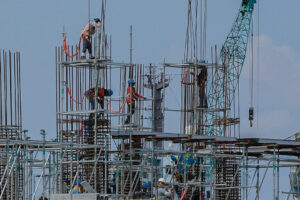By Kyle Aristophere T. Atienza, Reporter
THE NATIONAL Economic and Development Authority (NEDA) on Tuesday said the wage hike in Metro Manila would have little-to-no impact on growth targets, adding that it could be offset by an investment-driven expansion of the economy.
The P35 increase in the daily minimum wage of workers in the National Capital Region (NCR) would affect only about “one-tenth of 1%” of the Philippines’ gross domestic product, NEDA Secretary Arsenio M. Balisacan said at a Palace briefing.
“Our estimates so far suggest that the national output or gross domestic product would be impacted negatively, but it’s a very small impact,” he said.
The NCR wage board approved the hike, which will take effect on July 17, days before President Ferdinand R. Marcos, Jr.’s third State of the Nation Address. This was made against the backdrop of labor groups’ calls for a legislated wage hike ranging from P100 to P750.
The wage hike could affect 40,000 to 140,000 workers if small businesses end up closing shop or reducing their personnel Mr. Balisacan said, but added the number is “negligible.”
“As long as the economy is expanding because of other things like investments coming in, then the offsets would be there,” he said. “The economy can still grow.”
The Philippines’ GDP expanded by 5.7% in the first quarter, from 6.4% a year ago and 5.5% in the fourth quarter.
But economists said it does not necessarily reflect the state of the Philippine economy, with Fitch Solutions’ unit BMI citing the 4.6% drop in household spending, which was the slowest since the 4.8% drop in the first quarter of 2021.
“We do agree that the NCR wage hike will not impact on economic growth because the amount given is negligible at just 0.9% of Metro Manila establishments’ profits and because the wage hike is barely adding to the purchasing power of worker families,” said Jose Enrique “Sonny” A. Africa, executive director of think tank IBON Foundation.
“Greater aggregate demand from wage hikes driving greater consumption spending is a more sustainable and reliable incentive for investments than a cheap labor regime,” he said in a Facebook Messenger chat.
Mr. Africa noted that only six regions issued wage orders this year. The last wage orders in 11 other regions were issued in September to December 2023.
Mr. Balisacan said the growing economy would be able to provide alternative jobs for people who may be affected by any wage increase.
“New jobs open up in the economy and our economy continues to grow at 6 to 7% this year so that we’ll be accompanied by quite a lot of jobs,” he noted.
The jobless rate hit a four-month high of 4.1% in May from 4% in April as the size of the labor force expanded.
Mr. Balisacan said the recent employment data should not be compared with April 2024 due to seasonality factors.
Many of the 600,000 new jobs created in May were in manufacturing, industry, and services sectors, he noted.
“The indicators of the quality of jobs also are encouraging,” he added, noting that the underemployment rate or the number of people seeking additional jobs dropped to 9.9% in May from 11.7% a year ago. “That’s very encouraging.”
But Mr. Africa said a number of new jobs created in May involve construction work, which is among the worst paying sectors with P540 average daily wage.
“The majority of wage and salary work pays so poorly that simply being classified as wage and salary work is an unreliable indicator of the quality of work,” he said.
“Underemployment has traditionally been used as an indirect indicator of the quality of work but these days any decline may just mean that Filipinos have stopped looking for additional work rather than that they are already earning enough from the work they have,” he added
Labor Secretary Bienvenido E. Laguesma said at the same briefing that the agency conducted about 2,000 job fairs last year.
He said DoLE will link workers affected by the wage hike to job opportunities. It will conduct reskilling and upskilling programs for them, he added.
Meanwhie, Mr. Laguesma said that “job generation and job creation is actually the domain of the private sector.”
“Government’s responsibility is to be able to create an enabling environment conducive to business.”
Calls for wage hikes across the country have been renewed amid elevated inflation which averaged 3.5% in the first six months of the year.
Inflation-adjusted wages were 17.5% to 24.6% lower than the current daily minimum wages across the country, according to a BusinessWorld research. After accounting for inflation, the real wage in Metro Manila is now at P503.51.
Mr. Balisacan said NEDA is “optimistic” that inflation will ease further since the El Niño weather pattern, which was marked by extreme droughts in the Philippines, is “now over.”
But he did note continuing disruptions to the global rice markets amid export curbs by India and Vietnam.
